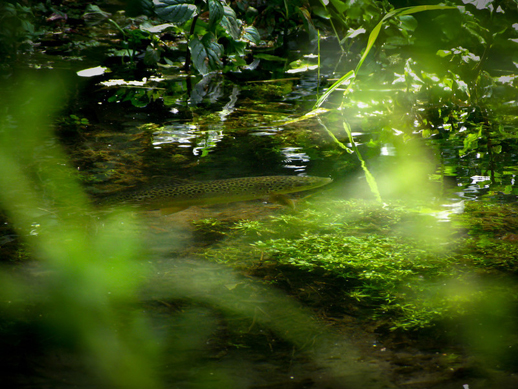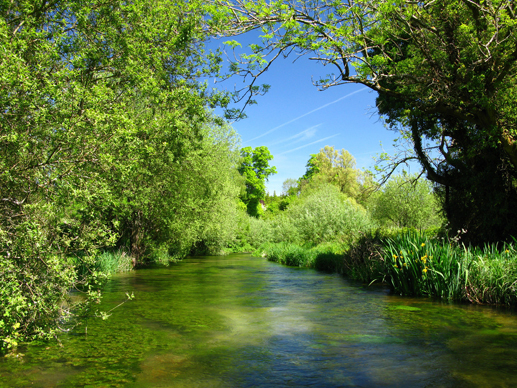Words and pictures by Charles Rangeley Wilson.
Slowly we are waking up to the fact that we have in southern England an almost unique eco-system comparable for its natural wonder with any on Earth, and to the fact that for the last fifty years we have been destroying it.
A week ago last Monday I attended a conference in Stockbridge convened by Mr George Hollingberry MP and attended by many people who care about chalk stream conservation. Almost 100 river keepers, conservationists, representatives from rivers trusts, wildlife trusts, and major NGOs such as WWF and the Wild Trout Trust crammed into the standing-room only bar at the Grosvenor Hotel – home to the oldest chalk stream angling club in England. We listened to impassioned speeches my Mr Hollingberry himself and Mr Martin Salter MP. And I’m sure, if he could have been there, we would have heard similar rousing sentiments from Mr Richard Benyon MP too. He – along with a growing crowd of MPs whose constituencies lie on chalk – also cares about the fate of these rivers.
We listened also to speeches from representatives of DEFRA, the Environment Agency, (but unfortunately not from OFWAT): less rousing, more familiar. Frighteningly, frustratingly familiar. Now is not the time for haste, we heard, now is the time for considered, patient deliberation. Oh Lord, spare us that charter for sitting on your hands. The day was a strange mix of invigorating can do-ism and enervating Orwellian double-speak.
But, we came away with the idea for getting expert minds together, and composing a Chalk Stream Charter – a list of policy demands for the Government. As I explain below … this could be a great initiative. Or it could be what feels like a great initiative, but is in fact another meeting standing in for actually doing something. I didn’t get my chance at a question in the brief Q and A held at the end and so wrote a letter to Mr Hollingberry afterwards, and have copied the gist of it below.
There is ONE roadblock to saving our chalk streams: OFWAT
“Dear Mr Hollingberry,
thank you for organising Monday’s conference. I hope something really positive can come out of it.
Firstly, I for one will happily do whatever I can to help you draw up this Chalk Stream Charter: you can count me in. The charter was Tony Juniper’s idea and it was the big idea that came out of the summit. At times like this he said, when the process seems to have stalled, you need to up the ante with a campaign.
But the not inconsiderable media might of WWF has been waging just such a campaign for the past five or six years: it has been called Rivers on the Edge. Several of the MPs involved on Monday were at the launch in London years ago. Other MPs have attended meetings on the beleaguered chalk streams of Hertfordshire, or have been taken to banks of the River Itchen and been persuaded of the need to preserve this global heritage. The English chalk stream as our rain forest, our melting ice-cap, was a slogan I wrote for the campaign at its outset. Long before WWF started Richard Slocock was campaigning for the River Piddle. David Stimpson and his friends on the River Beane have been campaigning for decades. So have the those who love the Driffield Beck in Yorkshire, the Darenth in Kent, the Mimram in Herts. The chalk streams around London have been on the edge of death since the 1960s.
But the representative from DEFRA carefully and patiently explained to us how government was going to avoid kicking the can down the road by … kicking it down the road. It was frustrating to listen to. We needed more time, he said, to get it right.
People have known the solution since the start of the problem. How much more time do we need? Mark Lloyd from The Angling Trust was right. It does sound like we are whistling while Rome burns.
Maybe an extra something can be brought into the mix with this Charter, something that will catalyse actual, lasting change. But yesterday’s conclusion felt eerily like the point in Life of Brian when the Judean People’s Front, forced to the point of action, conclude that they all need another meeting.
On Monday, more or less all the questions expressed symptoms on a local scale of the same BIG problem that exists on a national scale. But the meeting closed without actually nailing it to the ground.
The problem is that chalk aquifer water is free.
The solution is to make it expensive.
It is as simple as that.
Only when OFWAT clears the way for this will we save our chalk streams. Abstractors have to develop alternative sources. These are eminently possible: reservoirs, river mouths etc. But right now chalk water is uphill, clean and free, whilst other sources are downhill and dirty or otherwise expensive. Somehow this price gradient has to be tipped the other way.
And so we are waiting for OFWAT who currently do not have a remit to protect chalk streams. That is the road-block.
It is not a matter of more campaigning by the passionate few. It is not a matter of carrying public opinion. It is not a matter of dilly dallying under the guise of ‘getting it right’. It is a matter of political will. MPs such as yourself and Mr Walker, and Mr Benyon and Mr Salter must win this argument with the regulator.
If we need a Chalk Stream Charter to help carry the debate, then let’s draw one up. If we can get every River and Wildlife Trust, every NGO, and thousands of signatures behind one statement and you can apply the weight of that and of your political persuasion to one point on the rock in the road that is OFWAT, then maybe we can get it to move. But it is vital that this Charter builds on what has come before and doesn’t just reinvent the wheel … or become a proxy for the action we already know we need.
Sincerely yours,
Charles Rangeley-Wilson.”

